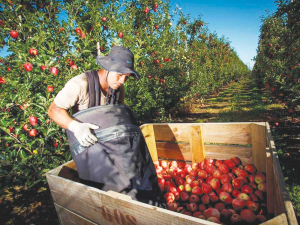Cloudy Bay Good Pick Initiative Supports RSE Workers’ Small Business Ventures
When Ben Enock came to New Zealand for vineyard work in 2007, his primary aim was to pay for his children's education at home in Vanuatu.
 Agriculture Minister Damien O'Connor warns that negative stories relating to the treatment of RSE workers are damaging for our reputation.
Agriculture Minister Damien O'Connor warns that negative stories relating to the treatment of RSE workers are damaging for our reputation.
Agriculture Minister Damien O'Connor has joined the chorus of concern about the treatment of some RSE workers from the Pacific.
O'Connor says he's been in Marlborough where a particular issue around the poor treatment of RSE workers has been alleged. He says people in that region are genuinely concerned about the "appalling behaviour" of some who employ RSE workers.
"The RSE scheme is an incredibly valuable cooperative arrangement between Pacific nations and NZ," he told Hort News.
"Any negative stories relating to the treatment of those people are damaging for our reputation. I think it's outrageous that anyone who has been prosecuted before for any issue relating to employment should be entitled to employ RSE workers. I find that a shoking revelation."
O'Connor says the employment conditions for RSE workers needs to be thoroughly investigated. While he was aware of some reports years ago about this kind of treatment of workers, he'd hoped that the industry and the Department of Labour inspectors employed by MBIE had stamped these practices out.
"The reports are very disturbing and the industry has to realise that if anyone turns a blind eye to this kind of behaviour they are complicit and they are putting their whole industry at risk."
He adds that in order to find out about the ill treatment of RSE workers, they have to rely on the community and reports from individual growers.
On a more positive note, O'Connor has seen for himself some of the huge investment that's gone into facilities for RSE workers. He says those growers are to be acknowledged and praised for ensuring that new accommodation can be used by RSE and NZ workers and is of a standard to which all facilities should be built.
O'Connor says any case of appalling treatment of RSE workers has serious implications for future NZ horticulture exports.
"There have been examples in the hort sector where shipments to customers have been thoroughly checked, not only for the residue levels but also the labour that has been used to produce the goods," he told Hort News. "That will only increase as customers are more discerning and looking to the social licence and labour components of food production."
O'Connor says the recent FTAs with the EU and the UK incorporate agreements that require adherence to the highest standards of labour and if any of the parties don't meet those standards that could trigger access provisions for NZ being withdrawn.
"That's something we have to be mindful of."
O'Connor says another risk is that RSE workers from the Pacific will not come to NZ if they feel they are being ill-treated or ripped off.
He says there are already plans by the Samoan Government to put a limit on the number of its workers going overseas.
"But we do have to be mindful that the reports are exceptions to what is an ever improving standard of labour and conditions for RSE workers. But the scheme will be judged by the lowest common denominator and all employers have to be mindful of this."
Agrisea NZ has appointed Craig Hudson as it's new chief growth officer.
State farmer Landcorp, trading as Pamu, is a forecasting a full-year net profit of around $100 million.
Tony Aitken, chief executive of Ruralco, has been awarded the Excellence in Business Leadership Award at the ANZ Business of the Year Awards.
Global trade has been thrown into another bout of uncertainty following the overnight ruling by US Supreme Court, striking down President Donald Trump's decision to impose additional tariffs on trading partners.
Controls on the movement of fruit and vegetables in the Auckland suburb of Mt Roskill have been lifted.
Fonterra farmer shareholders and unit holders are in line for another payment in April.

OPINION: Here w go: the election date is set for November 7 and the politicians are out of the gate…
OPINION: ECan data was released a few days ago showing Canterbury farmers have made “giant strides on environmental performance”.